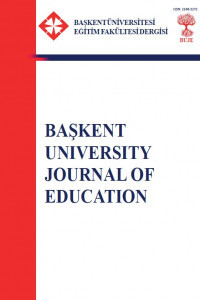Öğretmen Adaylarının Bilimin Doğası Öğretimine Yönelik Planlama Becerilerinin İncelenmesi
Bilimin doğası öğretimi, öğretmen eğitimi, yorumlayıcı nitel çalışma
Investigation of Pre-Service Elementary Science Teachers’ Nature of Science Instructional Planning
___
- Abd-El-Khalick, F., & Lederman, N. G. 2000 . Improving science teachers’ conceptions of nature of science: A critical review of the literature. International Journal of Science Education, 22 7 , 665-701.
- Akerson, V., Nargund-Joshi, V., Weiland, I., Pongsanon & K., Avsar, B. 2013 . What third-grade students of differing ability levels learn about nature of science after a year of instruction. International Journal of
- Science Education,1-33.
- Akerson, V.L., Carter, I. & Pongsanon, K. 2019 . Teaching and Learning Nature of Science in Elementary Classrooms. Sci & Educ 28, 391–411.
- Akerson, V. L., Donnelly, L. A., Riggs, M. L., & Eastwood, J. L. 2012 . Developing a community of practice to support preservice elementary teachers’ nature of science instruction. International Journal of ScienceEducation, 34 9 , 1371-1392.
- Akerson, V. L., Pongsanon, K., Rogers, M. A. P., Carter, I., & Galindo, E. 2017 . Exploring the use of lesson study to develop elementary preservice teachers’ pedagogical content knowledge for teaching nature of science.International Journal of Science and Mathematics Education,15 2 , 293-312
- Bilican, K. 2014 . Development of Pre-Service Science Teachers ‘nature Of Science Views and Nature of Science Instructional Planning within a Contextualized Explicit Reflective Approach.Unpublished doctoral dissertation, METU, Ankara.
- Creswell, J. W. 2007 . Qualitative enquiry and research design: Choosing among five approaches. US: Sagepublications Ltd.
- Edgerly, H., Kruse, J., & Wilcox, J. 2022 . Investigating Elementary Teachers’ Views, Implementation, and Longitudinal Enactment of Nature of Science Instruction. Science & Education, 1-25.
- Hanuscin, D. L., Lee, M. H., & Akerson, V. L. 2011 . Elementary teachers' pedagogical content knowledge for teaching the nature of science. Science education, 95 1 , 145-167.
- Hinds, P.S., Vogel, R.J., Clarke-Steffen, L. 1997 'The possibilities and pitfalls of doing a secondary analysis of a qualitative data set', Qualitative Health Research, vol. 7 3 : 408-24.
- Khishfe, R., & Abd‐El‐Khalick, F. 2002 . Influence of explicit and reflective versus implicit inquiry‐oriented instruction on sixth graders' views of nature of science. Journal of Research in Science Teaching: The Official Journal of the National Association for Research in Science Teaching, 39 7 , 551-578.
- Kruse, J., Kent-Schneider, I., Voss, S., Zacharski, K., & Rockefeller, M. 2021 . Investigating Student Nature of Science Views as Reflections of Authentic Science. Science & Education, 30 5 , 1211–1231.
- Lederman, N. G. 1992 . Students' and teachers' conceptions of the nature of science: A review of the research. Journal of Research in Science Teaching,29 4 , 331-359.
- Lederman, N. G. 1999 . Teachers' understanding of the nature of science and classroom practice: Factors that facilitate or impede the relationship. Journal of Research in Science Teaching, 36 8 , 916-929.
- Lederman, N. G., Abd‐El‐Khalick, F., Bell, R. L., & Schwartz, R. S. 2002 . Views of nature of science questionnaire: Toward valid and meaningful assessment of learners' conceptions of nature of science. Journal of Research in Science Teaching, 39 6 , 497-521
- Lederman, N.G. 2007 . The nature of science: Past, present, and future. In S.K.Abell & N.G.Lederman Eds. , Handbook of Research on Science Education. London: Lawrence Erlbaum & Associates, Publishers.
- Lederman, N. G., & Lederman, J. S. 2019 . Teaching and learning nature of scientific knowledge: Is it Déjà vu all over again?. Disciplinary and Interdisciplinary Science Education Research, 1 1 , 1-9.
- MEB 2013, 2018 . İlköğretim Kurumları İlkokullar ve Ortaokullar Fen Bilimleri Dersi 3, 4, 5, 6, 7, ve 8. Sınıflar Öğretim Programı. Ankara: Milli Eğitim Bakanlığı Talim ve Terbiye Kurulu Başkanlığı.
- Merriam, S. B. 2009 . Qualitative research: A guide to design and implementation: Revised and expanded from qualitative research and case studyapplications in education. San Franscisco: Jossey-Bass.
- Supprakob, S., Faikhamta, C., & Suwanruji, P. 2016 . Using the lens of pedagogical content knowledge for teaching the nature of science to portray novice chemistry teachers' transforming NOS in early years of teaching profession. Chemistry Education Research and Practice,17 4 , 1067-1080
- Szabo, V. & Strang, V.R. 1997 'Secondary analysis of qualitative data', Advances in Nursing Science, vol. 20 2 : 66-74.
- Wahbeh, N., & Abd-El-Khalick, F. 2014 . Revisiting the Translation of Nature of Science Understandings into Instructional Practice: Teachers' nature of science pedagogical content knowledge. International Journal of Science Education, 36 3 , 425-466.
- Başlangıç: 2014
- Yayıncı: Başkent Üniversitesi
Farklı Okul Türlerinde Okul İklimi Nasıl Değişmektedir?
Zeynep KAYA AYBEK, Başak ERCAN, Engin GÜVEN, Rıza SALAR
Öğretmen Adaylarının Bilimin Doğası Öğretimine Yönelik Planlama Becerilerinin İncelenmesi
Akademik Personelin Plaza Dili’ni Kullanım Durumunun İncelenmesi: Küreselleşmenin Dile Yansıması
Hayat Bilgisi Dersi Öğretim Programı Kazanımlarının Yaşam Becerileri Kapsamında İncelenmesi
İmgehan ÖZKAN ELGÜN, Funda UYSAL
Katz Kuramına göre Okul Yöneticisi Yeterlik Envanteri KOYYE Kapsam Geçerliği ve Güvenirlik Çalışması
Gülnur AK KÜÇÜKÇAYIR, Necati CEMALOĞLU
Örnek Olaylarla Bilgi Uçurma Davranışına Yönelik Yönetici ve Öğretmen Görüşleri
Milli Eğitim Şûralarında Eğitim ve Okul Yönetimi
Veli ve Öğretmen Görüşlerine Göre Covid-19 Pandemi Sürecinde Uzaktan Eğitimin Görünümü
Veli Toplantılarına Yönelik Sınıf Öğretmenlerinin Görüşleri: Fenomenolojik Bir Çalışma
